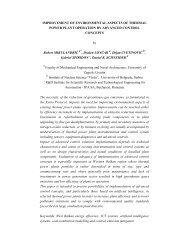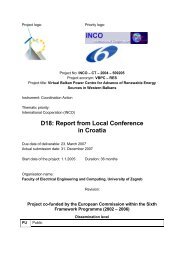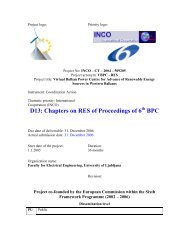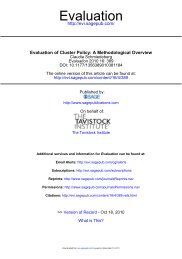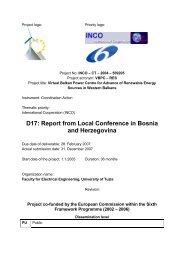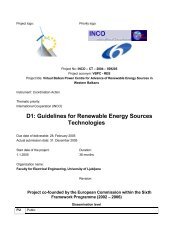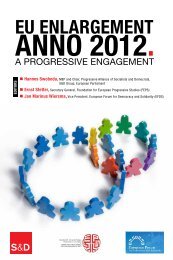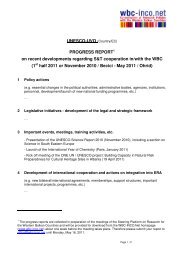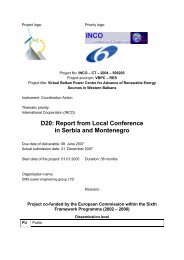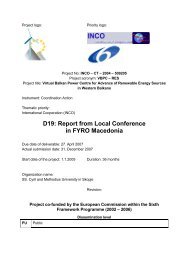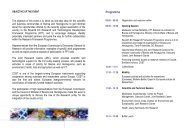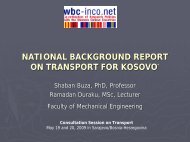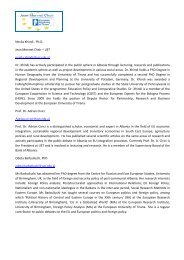S&T Country Report - Albania - WBC-INCO Net
S&T Country Report - Albania - WBC-INCO Net
S&T Country Report - Albania - WBC-INCO Net
You also want an ePaper? Increase the reach of your titles
YUMPU automatically turns print PDFs into web optimized ePapers that Google loves.
Prof. Mirjana Dragičević from the Faculty of Economics, University of Zagreb, an<br />
expert on clusters in Croatia, summarised the situation with cluster development at<br />
the beginning of 2007 in one of her articles as follows: 'Regional clusters became the<br />
strategic development tool in achieving the Lisbon agenda in Europe. The same is<br />
the case in most post-transition economies. The situation in Croatia is different,<br />
because the institutional prerequisites for the cluster development are not completely<br />
developed. Croatia is still not divided into the regions, according to the EU standards<br />
and regional statistical accounts are not realised yet and there is no relevant basis to<br />
comparative regional statistics. There is a low level of communication and<br />
coordination between national, counties and local authorities. Adequate<br />
microeconomic policies that support cluster development are missing, such as<br />
educational policy and incentive policy to foreign direct investment.<br />
On the national level the Regional development strategy is built up, the same as the<br />
regional operational plans in most counties. Regional development agencies also<br />
exist in most counties and they are mostly engaged on the SMEs projects and other<br />
actions dealing with competitiveness building. In different counties, the various types<br />
of business integrations are created, such as districts, business zones etc. Regional<br />
clusters are foreseen as the future goals in many documents, but only one<br />
internationally recognised cluster in Croatia exists (Dragičević and Obadić, 2006).<br />
As indicated at the international conference 'Clusters – Connecting Possibilities in<br />
South East Europe, which was held in Opatija, Croatia on April 20 – 21, 2007, there<br />
are several clusters, which will be financially supported by the Government, namely:<br />
Croatian Furniture Cluster, Croatian Agriculture Equipment Cluster, Croatian<br />
Yachting Cluster and Croatian Machine Tools Cluster. A number of cluster initiatives<br />
(e.g. Croatian Shipbuilding Cluster, ICT Cluster, Automobile Cluster, Textile Cluster),<br />
has started to operate just recently. For example, the ICT Cluster Varaždin, which is<br />
financially supported by the USAID, was officially opened on July 6, 2007.<br />
Name of<br />
initiative:<br />
Croatian Employers’ Association (CEA) - National Centre for<br />
Clusters<br />
Contact person: Vladimir Kovačević (Director)<br />
Email: hup@hup.hr<br />
Website: http://www.hup.hr/default.asp?ru=20&sid=&jezik=2<br />
The Croatian Employers’ Association is an independent, voluntary association of<br />
private entrepreneurs and employers founded during the period of Croatian transition<br />
to market economy in 1993. The CEA’s mission is to improve entrepreneurial and<br />
investment climate in order to strengthen Croatian economy competitiveness. In the<br />
process of strengthening Croatian economy competitiveness CEA proactively works<br />
with the trade unions and the Government.<br />
CEA represents its members' interests in many international organizations such as:<br />
Union des Industries de la Communauté européenne (UNICE), International<br />
page 19/HRV



